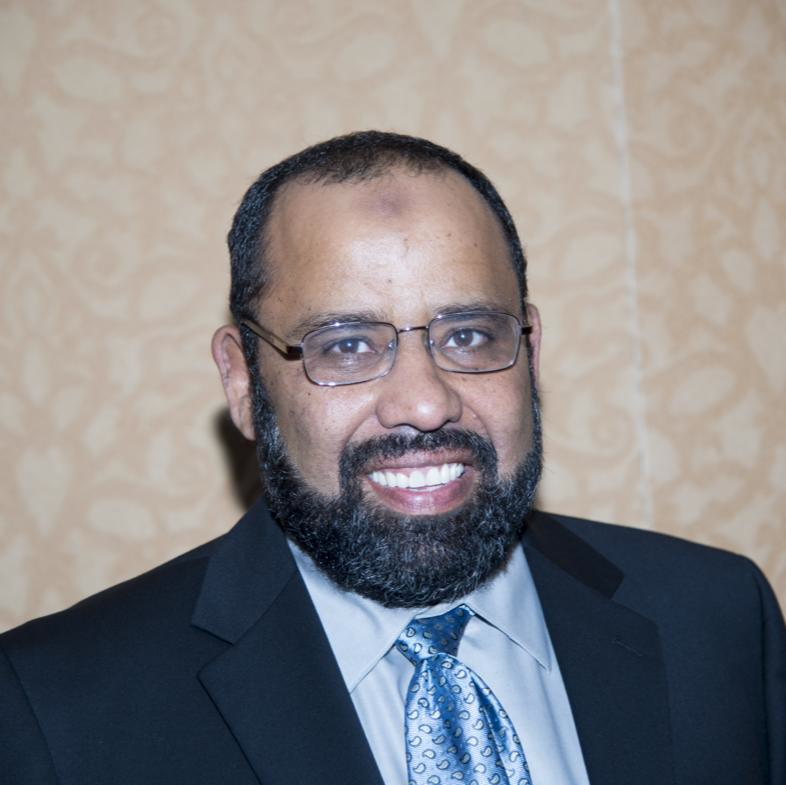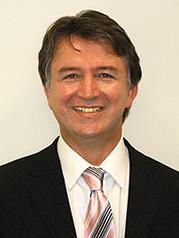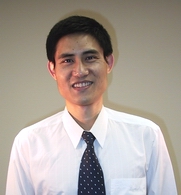![]()
![]()
![]()
Qualcomm Distinguished Lectures
ICNC 2014 features 6 Distinguished Lectures, which are OPEN to ALL attendees of the conference and workshops. The Distinguished Lecture Program is supported by Qualcomm.

John
Apostolopoulos (IEEE Fellow/IEEE Distinguished Lecturer)
CTO and Vice President, Cisco, USA
Title: Current and
Future Challenges in Application-Centric Networking
Time:
10:00-12:00, Monday, Feb. 3, 2014
Abstract:
Networking
technologies are evolving rapidly with advances in indoor location-based
services, software defined networks, ubiquitous video, network-based
analytics, and the Internet of Things. This is enabling compelling
applications delivered by application-centric networks. In this talk, we
will highlight important trends in networking technologies and applications,
the technical challenges that arise, and promising future directions of
research.
Biography:
John Apostolopoulos
is VP & CTO of the Enterprise Networking Group (ENG) at Cisco. ENG is a
$20B/year business that covers wired and wireless networking, mobility/BYOD,
SDN, Internet of Things, and video over enterprise networks. He is also
founder of the Enterprise Networking Labs whose goal is to increase
innovation in areas of strategic importance to ENG. Previously John was Lab
Director for the Mobile & Immersive Experience Lab (MIX Lab) at HP Labs.
The MIX Lab’s goal was to create compelling networked media experiences that
fundamentally change how people communicate, collaborate, socialize and
entertain. The MIX Lab conducted research on novel mobile devices and
sensing, mobile client/cloud multimedia computing, immersive environments,
video & audio signal processing, computer vision & graphics, multimedia
networking, glasses-free 3D, next-generation plastic displays, wireless, and
user experience design. John received a number of honors and awards for his
individual technical contributions including IEEE SPS Distinguished
Lecturer, IEEE Fellow, named “one of the world’s top 100 young (under 35)
innovators in science and technology” (TR100) by MIT Technology Review,
Certificate of Honor for contributing to the US Digital TV standard
(Engineering Emmy Award, 1997), and he also helped create the JPEG-2000
Security (JPSEC) standard. He has published over 100 papers, received
several paper awards, and has 60 granted US patents. John also has strong
ties with the academic community and was a Consulting Associate Professor of
EE at Stanford (2000-09) and is a frequent visiting lecturer at MIT. He
received his B.S., M.S., and Ph.D. from MIT.

Dennis Goeckel (IEEE Fellow)
Professor, University of Massachusetts at Amherst, USA
Title: Everlasting Security and Undetectability in Wireless
Communications (Lecture Slides)
Time:
13:30-15:30, Thursday, Feb. 6, 2014
Abstract:
Security and privacy are two of the most prominent concerns of contemporary
wireless communication systems, as evidenced by the recent surge in
traditional cryptographic and emerging information-theoretic approaches for
such. In this talk, we discuss the application of such approaches when the
goal is everlasting secrecy, which we define as preventing the interception
of any signal that can be stored and eventually decrypted by an interested
and determined eavesdropper. We focus on a number of network scenarios,
ranging from approaches in small networks to secrecy scaling in large
networks, and present a number of effective methods and their
characterization. We next turn to an even more restrictive security
setting: communication when not only the contents but even the presence of
the message must be hidden. After reviewing traditional spread spectrum
approaches to such, we present the emerging theory on undetectable wireless
communications and constructions for such.
Biography:
Dennis Goeckel received his BS from Purdue University in 1992, and his MS
and PhD from the University of Michigan in 1993 and 1996, respectively.
Since 1996, he has been with the Electrical and Computer Engineering
Department at the University of Massachusetts at Amherst, where he is
currently a Professor. He received the NSF CAREER Award in 1999 for "coded
modulation for high-speed wireless communications'' and is an IEEE Fellow
for "contributions to wireless communication systems and networks''. He has
been a Lilly Teaching Fellow (2000-2001), and he received the University of
Massachusetts Distinguished Teaching Award in 2007. He has served on the
Editorial Board of a number of international journals in communications and
networking: IEEE Transactions on Networking, IEEE Transactions on Mobile
Computing, IEEE Transaction on Wireless Communications, and the IEEE
Transactions on Communications. He has been a co-chair of the Technical
Program Committee of the Wireless Communications Theory Symposium of the
IEEE Global Communications Conference (2008), and the Communication Theory
Symposium of the IEEE Global Communications Conference (2004).

Lina
J. Karam (IEEE Fellow)
Professor, Arizona State University, USA
Title: Attentive Visual Processing - Towards User-Centric Visual
Technologies
Time:
10:00-12:00, Thursday, Feb. 6, 2014
Abstract:
We are surrounded by
data-rich environments and are inundated with information around us. This is
becoming increasingly more pronounced with the growth of advanced
communications and networking technologies including social media and mobile
devices. However, the human brain has limited resources and thus needs to
selectively focus these on what it perceives to be important based on the
situation at hand. This process is known as selective attention. In
particular, we rely heavily on our visual system for quickly capturing and
processing information about our surrounding data-rich environments using
the process of selective visual attention. Selective visual attention can be
exploited in developing advanced attentive technologies that can efficiently
capture and process information while optimizing the usage of available
resources and maximizing the user experience. This talk provides an overview
of the field of visual attention and its applications including past
efforts, current trends, challenges, and future directions.
Biography:
Lina J. Karam is a Professor in the School of Electrical, Computer & Energy
Engineering at Arizona State University, where she directs the Image, Video,
& Usabilty (IVU) research Laboratory. She is a Fellow of the IEEE for her
contributions in the image and video processing, visual communications, and
digital filtering areas. She was awarded a US National Science Foundation
CAREER Award, a NASA Technical Innovation Award, and the 2012 Intel
Outstanding Researcher Award. She was also awarded the Outstanding Faculty
Award by the IEEE Phoenix Section in 2012. She has over 100 technical
publications and she is a co-inventor on a number of patents. Dr. Karam has
served on several journal editorial boards, several conference organization
committees, and several technical committees. She served as the Technical
Program Chair of the 2009 IEEE International Conference on Image Processing
and as the lead guest editor of the Journal on Selected Topics in Signal
Processing, Special Issue on Visual Quality Assessment. She has co-founded
two international workshops (VPQM and QoMEX). She is currently serving as
the lead editor of the Proceedings of the IEEE, Special Issue on
Perceptual-based Media Processing and as the General Chair of the 2016 IEEE
International Conference on Image Processing. Her industrial experience
includes image and video compression development at AT&T Bell Labs (Murray
Hill), multi-dimensional data processing and visualization at Schlumberger,
and collaboration on computer vision, image/video processing, compression,
and transmission projects with industries including Intel, NEC, Motorola/Freescale,
General Dynamics, and NASA.

Ayman
Naguib (IEEE Fellow)
Senior
Director, Qualcomm, USA
Title: The Great
Indoors: The Next Frontier in Mobile Positioning
Time:
16:00-18:00, Thursday, Feb. 6, 2014
Abstract:
Indoor positioning is
the next frontier in location technology for mobile devices. Location-based
services (LBS) are an integral part of the mobile ecosystem today, relying
on the Global Positioning System (GPS) and other technologies. However,
while these technologies have been highly successful at positioning
outdoors, they either fail to obtain a fix or do not provide the necessary
accuracy indoors. Therefore a whole new world for LBS indoors, remains
unexplored. A new solution is needed for enabling positioning indoors and
several new applications can benefit from the presence of such capability
such as indoor navigation and search, aisle level location of retail items,
check-ins, gaming etc. This talk will provide an overview of the indoor
location landscape, discusses several use cases, challenges and approaches
to solve the problem. We will discuss multiple sources of information
including radio measurements, sensor data and building maps that can be used
for determining indoor position on mobile devices.
Biography:
Dr. Ayman Naguib is a
Senior Director of Engineering at Qualcomm Corporate Research and
Development, where he is leading the indoor positioning and navigation
research in Qualcomm's CR&D, where he has been since 2002. From 1996 to
2001, Dr. Naguib was a principal member of technical staff at AT&T Shannon
Labs, where he was one of the key researchers who pioneered the field of
space-time coding. Dr. Naguib has over 17 years of research and development
experience that spans several areas in wireless systems including array
signal processing and MIMO, space-time coding, OFDMA systems design,
wireless LAN, and indoor positioning and navigation. Dr. Naguib received his
the B.S. and M.S. in electrical in engineering from Cairo University in 1987
and 1990 resp., and M.S. in Statistics and the Ph.D. in Electrical
Engineering from Stanford University in 1993 and 1995 resp. Dr. Naguib has
56 granted US Patents and over 90 other pending USA patent applications. Dr.
Naguib has over 50 peer-reviewed journal and papers publications in
international conferences and journals and 3 book chapters. Dr. Naguib won
two IEEE best paper awards, his 1998 JSAC paper on space-time coding was
selected by the IEEE Communication Society as one of the 50 fundamental
papers published by the IEEE Communication Society, and he was named an IEEE
fellow in Dec 2006 for his pioneering work on space-time coding and signal
processing. Dr. Naguib served as an associate Editor for the IEEE
TRANSACTIONS ON COMMUNICATIONS from 2002 to 2007, and as a guest editor to a
number of IEEE transactions.

Panos Nasiopoulos (CAE Fellow)
Dolby Professor, University of British Columbia, Canada
Director,
Institute for Computing, Information and Cognitive Systems, UBC, Canada
Title:
3D Technology
Challenges: Capture, Compression, and Display
Time:
13:30-15:30, Monday, Feb. 3, 2014
Abstract:
Although 3D technology has been in existence for some time, there are
still many unresolved problems in capturing, transmitting and displaying 3D
content. 3D video technology can only be a lasting success if the perceived
image quality and viewing comfort are significantly better than those of
conventional 2D systems. Understanding the limitations of displaying 3D
content on different displays as well as the bandwidth limitations for
delivering such content are important challenges, and capturing methods need
to be systematically improved to accommodate these restrictions. We will
overview the inherent technological challenges in 3D technology including
guidelines and tools for capturing high quality life-like immersive video
content, objective quality metrics for camera systems, displays and
compression/content delivery schemes, compression schemes, and receiver-end
post-processing schemes that will offer the best possible 3D quality of
experience on a range of 3D devices with different displaying capabilities
Biography:
Dr. Panos Nasiopoulos received a Bachelor degree in Physics from the
Aristotle University of Thessaloniki, Greece, and a Bachelor, Master and
Ph.D. in Electrical and Computer Engineering from the University of British
Columbia, Canada. He is presently the Director of the Institute for
Computing, Information and Cognitive Systems which covers 7 Faculties and 18
Departments (160 faculty members and more than 1000 graduate students) at
the University of British Columbia (UBC). He is also a Professor with the
UBC department of Electrical and Computer Engineering, the Inaugural Holder
of the Dolby Professorship in Digital Multimedia, and the current Director
of the Master of Software Systems Program at UBC. Before joining UBC, he was
the President of Daikin Comtec US (founder of DVD) and Executive Vice
President of Sonic Solutions. He has made groundbreaking contributions to
industry and academia in the areas of interactive digital video (DVD
technology), 3D video, digital video compression, and video communications.
Dr. Nasiopoulos is a registered Professional Engineer in British Columbia, a
fellow of the Canadian Academy of Engineering, and has been an active member
of the Standards Council of Canada, MPEG, ACM and IEEE.

Dapeng Oliver Wu (IEEE Fellow)
Professor, University of Florida, USA
Title: Network Science and Its Application in Wireless Networking (Lecturer
Slides)
Time:
16:00-18:00, Monday, Feb. 3, 2014
Abstract:
Network science is a new and emerging scientific discipline that examines
the interconnections among diverse physical or engineered networks (such as
power grid and transportation networks), information networks, biological
networks, cognitive and semantic networks, economic networks (such as stock
markets), and social networks. This field of science seeks to discover
common principles, algorithms and tools that govern network structures,
functionalities, and behaviors. In this tutorial, I will discuss some major
problems and methodologies in network science. To illustrate the
application domains of network science, I will focus on distributed control
in wireless networks. In particular, I will present how to apply the
decomposition principle in network science to the problem of joint
congestion control and scheduling in multi-hop ad hoc networks with
multi-class services.
Biography:
Dapeng Oliver Wu received Ph.D. in Electrical and Computer Engineering from
Carnegie Mellon University, Pittsburgh, PA, in 2003. Since 2003, he has been
on the faculty of Electrical and Computer Engineering Department at
University of Florida, Gainesville, FL, where he is currently a Professor.
His research interests are in the areas of networking, communications, video
coding, image processing, computer vision, signal processing, and machine
learning. He received University of Florida Research Foundation
Professorship Award in 2009, AFOSR Young Investigator Program (YIP) Award in
2009, ONR Young Investigator Program (YIP) Award in 2008, NSF CAREER award
in 2007, the IEEE Circuits and Systems for Video Technology (CSVT)
Transactions Best Paper Award for Year 2001, the Best Paper Award in
Globecom 2011, and the Best Paper Award in QShine 2006. He is the founder of
IEEE Transactions on Network Science and Engineering. Currently, he serves
as an Associate Editor for IEEE Transactions on Circuits and Systems for
Video Technology, and International Journal of Ad Hoc and Ubiquitous
Computing. He was the founding Editor-in-Chief of Journal of Advances in
Multimedia between 2006 and 2008, and an Associate Editor for IEEE
Transactions on Wireless Communications and IEEE Transactions on Vehicular
Technology between 2004 and 2007. He has served as Technical Program
Committee (TPC) Chair for IEEE INFOCOM 2012, and as TPC Chair for IEEE
International Conference on Communications (ICC 2008), Signal Processing for
Communications Symposium. He served as Chair for the Award Committee,
Technical Committee on Multimedia Communications, IEEE Communications
Society.